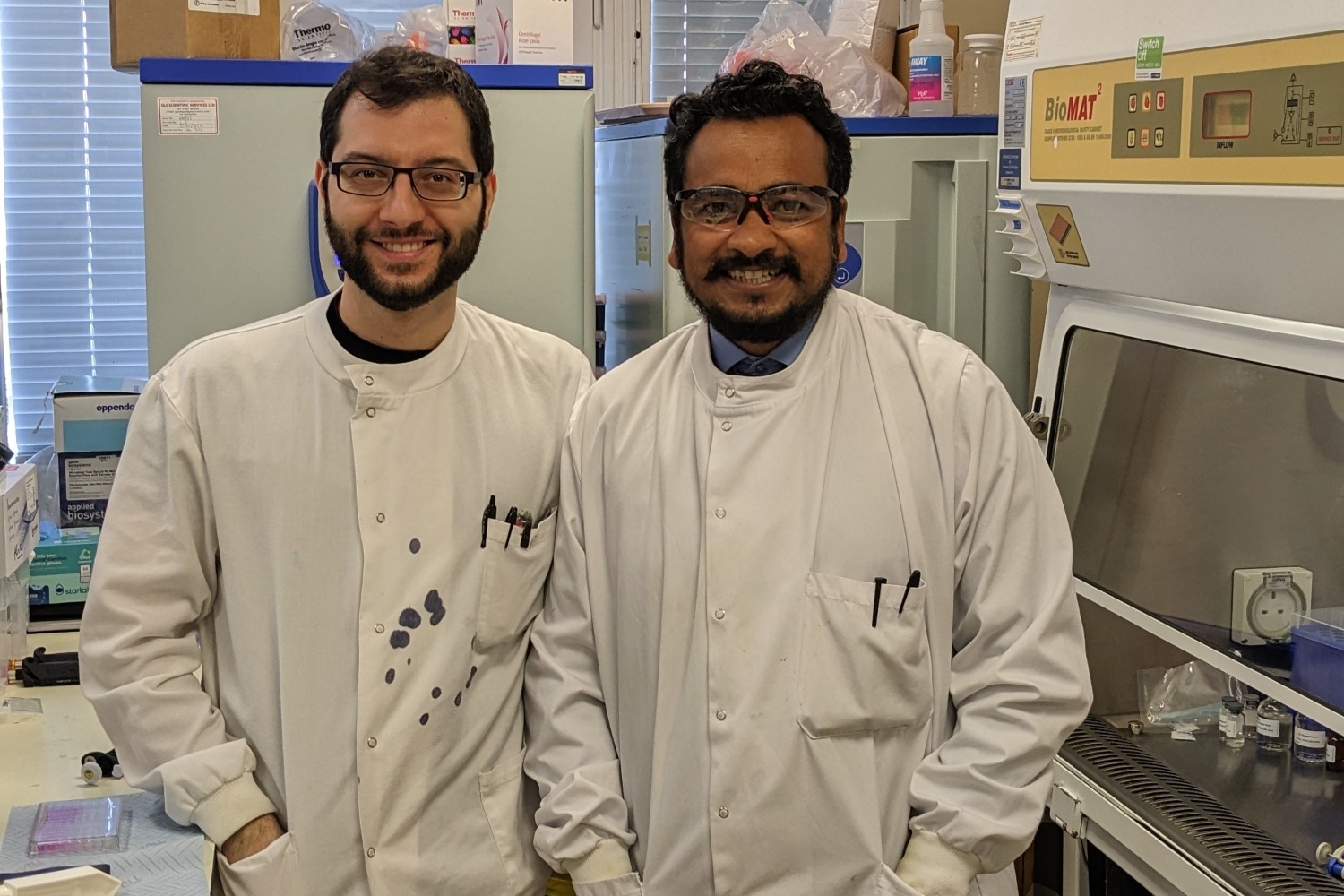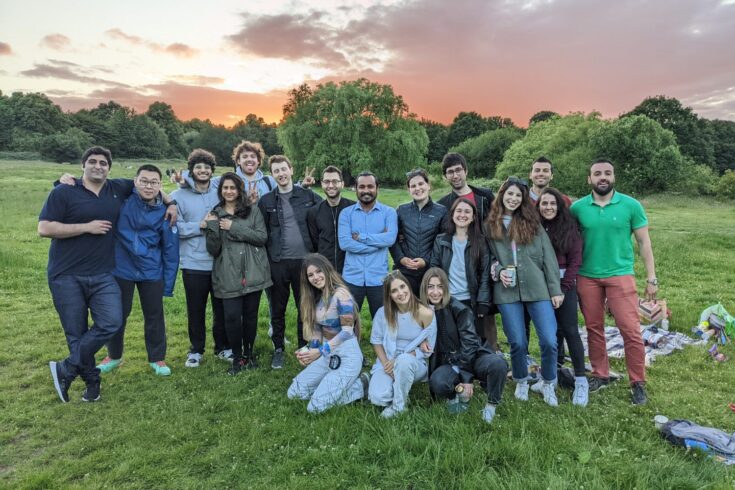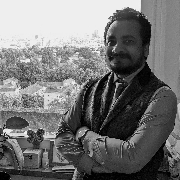The MRC CDA fellowship aims to support talented researchers who have gained a higher research degree to:
- lead their own research plans
- establish their own research team
- enable their transition to independent researcher
Dr Hirak Patra is a Professor of Precision Nanosystems and Advanced Therapeutics at University College London (UCL) and a former MRC CDA fellow. Here he shares his experience and advice for other researchers looking to pave their own path towards research independence.
A passion for science
Looking at my academic background, I did my undergrad and postgrad in chemistry and biochemistry, respectively, and then my PhD in nanotechnology in the City of Joy Calcutta (now Kolkata).
My postdoc was in Sweden on the application side of what I learned in my PhD.
I moved to Cambridge with the EU Marie-Sklodowska Curie Fellowship and later to Wolfson College with the Junior Research Fellowship. I then took an Associate Professor position at UCL and started my MRC CDA fellowship.
A little Bollywood motivation
My personal background is that I come from the very small village, Andharia in the state of West Bengal, in India.
Funnily enough, it’s not my passion for science which brought me to where I am today in London. It was a beloved Bollywood film, ‘Dilwale Dulhania Le Jayenge’ (usually referred to as DDLJ by fans) which was set here.
Growing up before the internet, the films and books I consumed were the only way to see the world. And watching DDLJ set in London and Europe really influenced me and I knew I never wanted to go anywhere else to work.
It has no connection to my professional career, but it motivated me to come here in pursuit of it.
Nanomedicine and regenerative medicine research
My major research is in nanomedicine and regenerative medicine.
As I always tell my students, to explain nanomedicine in its simplest form, nano is just a scale like centimetre, except it’s smaller. A nanometre is one billionth of a metre.
If you take an object, for example a gold ring, it has a specific set of properties, like conductivity, malleability and density. If you cut that gold ring into smaller pieces, these pieces will also have the same set of properties.
However, if you keep cutting down until you get to the nanoscale, they will have different and new properties as well as a different number of them.
And this is where the medicine part comes in, and why its application is so important. Because whatever is happening inside our bodies is also happening at the nanoscale.

Dr Hirak and his student in the lab. Credit: Dr Hirak Patra
My path to independence
As I was already keen to come to London, I looked for how that career trajectory would work for a researcher and found that fellowships were the best way. This is how I ultimately found the MRC CDA.
CDA feedback
When I applied the first time, I wasn’t successful because it’s a fiercely competitive fellowship.
However, I got feedback from reviewers about my application. I always believe that any feedback, whether it’s positive or negative, is a good thing because it helps you to assess your performance.
So, I tried to address the particular issues from my first application, and when I applied in the next round, I was successful. The opportunity to receive feedback on my application allowed me to learn from my mistakes and understand the important things I was missing.
I found that so helpful and valuable to shaping my career vision.
Protected research time
Additionally, the MRC CDA support allowed me to have protected research time. This means I had a reduced teaching burden, and a reduced admin burden, and could focus on my research.
The MRC CDA was great because there are other research fellowships that don’t give this flexibility and protected research time, to fully focus on your agenda.
No funding cap
Another benefit of the MRC CDA fellowship was the no cap on funding.
When I was trying to make the budget for my five years of the award, I was hesitant because I thought it was costing too much. But when I contacted the MRC CDA team, they told me not to worry, as long as I made sure to justify my budget.
This kind of flexibility is not available with most other grants.
Important first step
Most importantly, the MRC CDA allowed me to have that all important first step into independence.
I think there is no better way to learn than running your own program. This ability to transition to independence was a huge plus of the fellowship because it encouraged me to develop as a leader. It was the first time I was talking and thinking about my work as my own, rather than being a part of a project led by someone else. I was the leader of my own project now, and thinking in this way gave me a boost.
It was also helpful to have this external validation, because otherwise my work may have gone unnoticed. The MRC CDA can act like a badge of honour, and this really helped open doors.
My advice for others
I definitely would encourage others to apply for the MRC CDA. From what I’ve learned from my experience, here is my advice.
Address feedback
Firstly, as I mentioned, the fellowship is very competitive, but don’t let this discourage you. Because you get feedback from reviewers on your application, you can use the opportunity to address the comments in a future application if you’re not successful the first time.
Build your network
Secondly, build your network.
A common misconception, which I also had, is that the MRC CDA requires that you change your institution. You can do this if you want, but what is important is to show how you will be able to establish your own independent research niche.
Moving away from your current team can help, but getting someone new to sponsor you isn’t easy. That’s why building a network, and having the flexibility of the fellowship as a personal award is helpful. Because it means you can apply to the best institution, get different perspectives and start that journey towards independence.
I think networking is important, which comes naturally with CDA activities, because that is how you meet different people who know you and might sponsor you.
Do not be discouraged
Finally, I would say don’t let your own doubts about your research plan dissuade you, or think that you need to have a specific career trajectory to apply.
Just look at my own crazy trajectory that started because I moved to London from watching a Bollywood film, starting from chemistry to now nanomedicine.
So, that doesn’t really matter. What matters is whether the problem that you are trying to address has the appropriate narrative and what expertise you can bring to it.
Remember it’s not just about your background and performance, you have to be very compelling with evidence and your enthusiasm for your research.
Find out more
The people we nurture and support to become tomorrow’s leaders in discovery science are central to our mission. A highly skilled research workforce, capable of moving flexibly between academia, clinical practice, the NHS, and industry, is essential to the UK’s continued leadership in medical research.
How MRC will invest in people and develop skills is set out in the recently refreshed MRC priorities for training and careers.
Candidates seeking to make the challenging first step towards research independence are particularly encouraged to apply for our fellowships via an MRC CDA or (for clinicians) an MRC clinician scientist fellowship.
The 2025 MRC CDA applications are now open and will close at 4:00pm UK time on 10 September 2025.
For more information, please visit the MRC career development award page.




